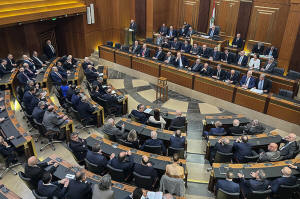Lebanon's parliament tries again to pick a president, after 12 failed
attempts over 2 years
 Send a link to a friend
Send a link to a friend
 [January 09, 2025]
By SALLY ABOU ALJOUD and ABBY SEWELL [January 09, 2025]
By SALLY ABOU ALJOUD and ABBY SEWELL
BEIRUT (AP) — Lebanon’s parliament convened Thursday to make yet another
effort to elect a president, filling a vacuum that's lasted for more
than two years.
A first round of voting showed Lebanese army commander Joseph Aoun as
the frontrunner, receiving 71 out of 128 votes but falling short of the
two-thirds majority needed to win outright. Of the rest, 37 lawmakers
cast blank ballots and 14 voted for “sovereignty and the constitution."
Parliament Speaker Nabih Berri adjourned the session for two hours,
after which legislators are set to return for another round of voting.
While 12 previous attempts have failed to choose a successor to former
President Michel Aoun, whose term ended in October 2022, there are
indications that Thursday's vote is likely to produce a head of state.
Aoun, no relation to the former president, is widely seen as the
preferred candidate of the United States and Saudi Arabia, whose
assistance Lebanon will need as it seeks to rebuild after a 14-month
conflict between Israel and the Lebanese militant group Hezbollah.
Hezbollah — which has been weakened politically and militarily by the
war with Israel — previously backed another candidate, Suleiman Frangieh,
the leader of a small Christian party in northern Lebanon with close
ties to former Syrian President Bashar Assad.

However, on Wednesday, Frangieh announced he had withdrawn from the race
and endorsed Aoun, apparently clearing the way for the army chief. Also
Wednesday, the Lebanese Forces, which leads the main parliamentary bloc
opposed to Hezbollah, endorsed Aoun.
All 128 members of the legislature were present for the vote Thursday.
Lebanon’s fractious sectarian power-sharing system is prone to deadlock,
both for political and procedural reasons. The small, crisis-battered
Mediterranean country has been through several extended presidential
vacancies, with the longest lasting nearly 2 1/2 years between May 2014
and October 2016. It ended when former President Michel Aoun was
elected.
The president's role in Lebanon is limited under the power-sharing
system in which the president is always a Maronite Christian, the prime
minister a Sunni Muslim and the speaker of parliament Shiite.
[to top of second column]
|

Lebanese lawmakers gather to elect a new president at the parliament
building in downtown Beirut, Lebanon, Thursday, Jan. 9, 2025. (AP
Photo/Hussein Malla)

However, only the president has the power to appoint or remove a
prime minister and cabinet. The caretaker government that has run
Lebanon for the last two years has reduced powers because it was not
appointed by a sitting president.
As a sitting army commander, Joseph Aoun is technically barred from
becoming president by Lebanon's constitution. The ban has been
waived before, but it means that Aoun faces additional procedural
hurdles.
Under normal circumstances, a presidential candidate in Lebanon can
be elected by a two-thirds majority of the 128-member house in the
first round of voting, or by a simple majority in a subsequent
round.
But because of the constitutional issues surrounding his election,
Aoun would need a two-thirds majority even in the second round.
Other contenders included Jihad Azour, a former finance minister who
is now the director of the Middle East and Central Asia Department
at the International Monetary Fund; and Elias al-Baysari, the acting
head of Lebanon’s General Security agency. Al-Baisary announced
Thursday that he was pulling out of the race.
The next government will face daunting challenges apart from
implementing the ceasefire agreement that ended the Israel-Hezbollah
war and seeking funds for reconstruction.
Lebanon is six years into an economic and financial crisis that
decimated the country's currency and wiped out the savings of many
Lebanese. The cash-strapped state electricity company provides only
a few hours of power a day.
The country's leaders reached a preliminary agreement with the IMF
for a bail-out package in 2022 but have made limited progress on
reforms required to clinch the deal.
All contents © copyright 2024 Associated Press. All rights reserved
 |